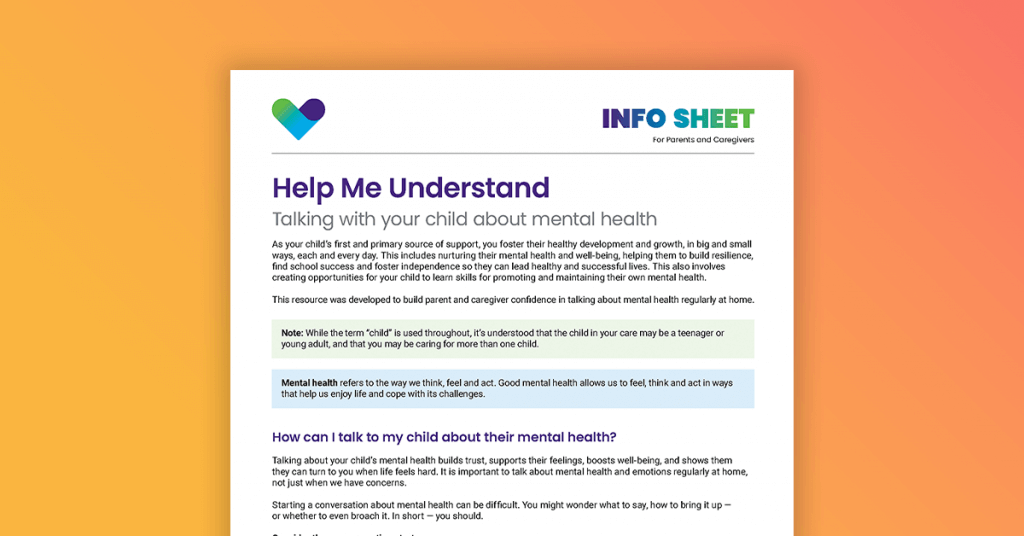School staff access the By Your Side Toolkit
Learn moreOn this page
Building a Strong, Supportive Relationship With Your Child
Caring for Yourself While Caring for Others – A Parent’s Guide to Self-Care
Easy and Fun Mental Health Activities for Home
Help Me Understand – Talking With Your Child About Mental Health
Helping Your Child Build Positive Relationships and Manage Conflict
Helping Your Child Understand and Manage Stress
Navigating Childhood Anxiety: Strategies for Understanding and Support
Building a Strong, Supportive Relationship With Your Child
Relationships play a vital role in a child’s social and emotional development. Parents and caregivers are a child’s first teacher and model the relationships they will form throughout their lives. Strong parent/caregiver and child relationships support positive mental health and well-being and help your child cope with challenges and recover from setbacks.

Caring for Yourself While Caring for Others – A Parent’s Guide to Self-Care
Raising children is both rewarding and challenging. As a parent/caregiver, it’s normal to struggle with conflicting feelings of love and gratitude, guilt and self-criticism. Time restraints, scheduling, financial responsibilities and juggling multiple needs at home are just a few of the many demands parents/caregivers experience.
The good news is that by acknowledging and accepting that parenting can be challenging, you take the first step in prioritizing your mental health to ensure your own well-being.


Help Me Understand – Talking With Your Child About Mental Health
As your child’s first and primary source of support, you foster their healthy development and growth, in big and small ways, each and every day. This includes nurturing their mental health and well-being, helping them to build resilience, find school success and foster independence so they can lead healthy and successful lives. This also involves creating opportunities for your child to learn skills for promoting and maintaining their own mental health.

Helping Your Child Build Positive Relationships and Manage Conflict
It’s human nature to want to feel loved, valued, and noticed by others, so it’s hardly surprising that there’s a direct link between our relationships and our health and well-being. As a parent/caregiver, you play an important role in helping your child to develop healthy relationships.

Helping Your Child Understand and Manage Stress
Stress is an unavoidable part of life. While not all stress is bad — at times, it provides energy and motivation — high levels of stress can negatively impact a child’s mental health and well-being.
The good news is that you, as a parent/caregiver, can help your child understand stress and develop healthy ways of managing it.

Navigating Childhood Anxiety: Strategies for Understanding and Support
Most of us feel anxious at times. It is normal and expected for your child to feel anxious sometimes as well. For example, your child may worry before a presentation or may feel nervous about making new friends on the first day of school. Low levels of anxiety can even be helpful—they can improve focus, problem-solving skills, and help us recognize potential dangers.
However, if your child’s anxiety becomes more intense or frequent, it may affect their ability to participate in everyday activities at school or at home. This could indicate a mental health problem that needs additional support.

Suicide Prevention Guide for Parents and Caregivers
Youth suicide is a complex, tragic, and sadly prevalent issue throughout Canada. Mental health and wellness promotion is a critical part of suicide prevention. When young people have strategies for staying mentally well and knowing when and how to ask for help if needed, the risk for suicidal thoughts and behaviours is reduced.

Supporting Your Child’s Well-being
As parents/caregivers, we want our children to grow up physically and mentally healthy, to build meaningful relationships, and to successfully navigate life’s challenges. We want them to have confidence and to feel emotionally healthy and strong. In short, we want our children to have a strong sense of well-being.


